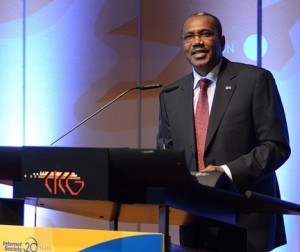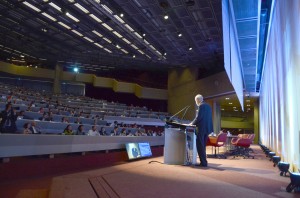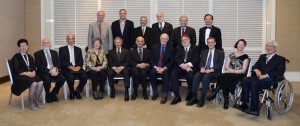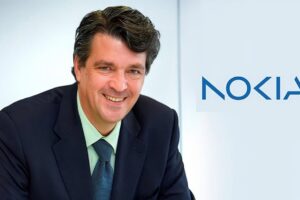The Internet Society, the world’s trusted independent source of leadership for Internet policy and technology standards, celebrates its 20th anniversary this year. Global INET 2012 conference took place at the International Conference Centre, Geneva, Switzerland from 22-24 April.
The theme of 20th anniversary conference was “Connect. Collaborate. Celebrate!” where hundreds of policy makers, technologists, government representatives, business executives and civil society leaders discussed the topics and challenges that will shape the future of the Internet. The conference enclosed a program of roundtables, exclusive sessions, collaborative leadership exchanges and networking sessions inviting over 50 speakers and panelists, offering their insights into topics such as Internet governance, law, ecosystems, intellectual property, social networking and the link between the Internet and economic transformation. Key activities of the events of INET included: working together to identify and address critical topics that will shape the future of the Internet; networking with other leaders, Internet pioneers and futurists; participating in strategy discussions; and honoring key Internet contributors who were named to the inaugural class of the Internet Hall of Fame.
Global INET key note speakers included Dr. Hamadoun Touré (Secretary General, ITU), Jimmy Wales (Founder, Wikipedia), Francis Gurry (Director General, WIPO), Mitchell Baker (Leader of the Mozilla Project), Vinton G. Cerf (Vice President & Chief Internet Evangelist, Google), Dr. Leonard Kleinrock (Distinguished Professor, UCLA) and Lynn St. Amour (President and CEO, Internet Society).
During his keynote speech, Dr. Leonard Kleinrock said that In 1969, the development of the Internet was really overshadowed by other high-impact, newsworthy events taking place at the time, becoming cultural touchstones that last today, among them: the biggest moment in space exploration with the first arrival of men on the moon, the Woodstock music festival, the New York Mets won the World Series of Major League Baseball, Charles Mansion went on a killing spree, and – by the way – the Internet was born.
“Nobody noticed, even those of us who were putting it together didn’t notice in some sense,” Kleinrock said of the networking efforts of early researchers dedicated to exploring the possibilities of computers and packet switching. “But if you look at the impact, it had a greater impact than all of those events together.” The environment in which the Net was created had a significant influence on the minds behind it, he contends.
“As we talk about some of the technology, you have to understand the key to the success of the Internet wasn’t the technology being developed, but the environment,” he said. “It was a golden era where creativity and good ideas were flowing all over the place. It’s an era not to be repeated, unfortunately.”
The development of ARPA, launched in 1953, was supplemented by the ongoing work of researchers creating the underpinnings of the Internet, including Kleinrock, Paul Baran and Donald Davies. As the technology grew, the public generally showed little faith in the project. “Nobody cared and they said it wouldn’t work,” Kleinrock said. “’Even if it does work, we want nothing to do with it.’ That was the mentality.”
Nevertheless, in the fall of that year, the first IMPs – interface message processors allowing communications between computers – were established at UCLA and Stanford Research Institute, and the first message was sent via the Internet at 10:30 p.m. Oct. 29. Kleinrock told the audience that the duty of the scientists at UCLA was to start the log-in by typing L-O-G. They typed the “L” and asked SRI, “Did you get it?” Yes, they received the “L.” They typed and sent the “O” and it was received at SRI. They typed the “G” and, Kleinrock exclaimed, “Crash! The first word sent on the Internet was ‘Lo’!
“You couldn’t have asked for a more succinct, prophetic message than that by accident, but it is the best one ever and hopefully no one will ever forget that,” he added.
Wikipedia founder Jimmy Wales shared two of his predictions for the future of the Internet, one he called “safe” and the other he identified as “speculative.” Wales said he was reluctant to make any claims about the next steps for the Internet.
“Predicting the future is notoriously difficult,” he said. Wales predicted the continued growth of massive connectivity as his number-one point. He said that despite some progress made over the past few years the greatest challenges still remain in the developing world, not the developed. There are billions of people who remain without access. “Basically, the easy parts are done,” he said.
Wales used the analogy of a smartphone he himself uses. A friend purchased it for him in Kenya. As many as 350,000 units of this smart phone, an Android-OS phone that costs around $80, have sold in Kenya alone, proving that smartphone capability at a reasonable price is on the horizon. While the “poorest of the poor” are still being missed, there is potential for mass affordability in the near future he said. In Nigeria, Wales said, the number of people online grew from 1 percent of the populace to 29 percent between 2000 and 2009.
“The kind of growth we all remember from the dot.com days is going on in Nigeria now,” he added.
Wales said people sometimes think about the Internet in developing areas of Africa from a limited-view paradigm – many often cite programs where farmers use their smartphones to track crop prices or track malaria outbreaks, and while this “do-gooder development model” is present, he says, many of these users are actually living their lives online – in social and work circumstances – in much the same way as users in many developed nations: using Google, connecting on Facebook, Tweeting and reading Wikipedia and the local news.
The model however, for languages on the Internet will have to change, Wales said. In the past, it could generally be assumed than anyone using the Internet in places like Kenya or Nigeria or India knew English, but there has been rapid growth in non-English and non-French-language websites.
Wales then moved on to his second, bolder prediction: He announced the death of Hollywood as we know it. He used the history of Wikipedia and the capabilities of young Internet users to prove his point. The technology for Wikipedia all existed six years before its actual founding in 2001. In 1995, Ward Cunningham invented the first wiki.
“I would say Wikipedia is not a technological innovation,” Wales said. “It’s a social innovation.”
Hollywood will be destroyed; nobody will notice.
In much the same way, he said, the technology for independent filmmaking and video production already exists in the hands of youth who have “native fluency” in use of the Internet and software.
“The best way to predict the future is to build it, so let’s build it!” he concluded, sharing a quote that many have embraced as they look ahead.

He added that the Internet has taken down barriers.
“This is the first time in human history that almost everyone, everyone has access to the enabling power of technology,” he said. “It is the first time they can put themselves on the map or have a choice and, most importantly, have a voice in their own language. It is the first time that they can become truly visible in their own right by passing their official narrative with quite a remarkable speed and for the first time it has become impossible to be airbrushed out of history. This dramatically affects the relationship between the governors and the governed, between the company and its customers and even between husbands and wives and parents and their children. The democratization not just of communication but of knowledge is already having a very profound and I believe beneficial effect on our society.”
He said those in positions of power will need to embrace and recognize this. “Those who may once have been or felt powerless need to recognize that they are the new agents of change,” he urged, “and they also need to recognize they have the responsibility to use that newfound influence carefully and wisely.”
Toure said two-thirds of the world’s people still do not have Internet access, and he emphasized the need to move closer to universal access to a broadband connection, adding that the best access is available only to a minority of people globally. “We risk creating a world of the Internet rich and Internet poor,” he warned, “a world where the new broadband divide is even more worrying than the digital divide we had before ubiquitous mobile phones.”
He mentioned the importance of the Broadband Commission established by ITU and UNESCO in 2010 to encourage the implementation of national broadband plans.
“Broadband networks should be considered in the 21st century as basic, like roads, railways, water and power networks,” he urged. “Broadband is vital in helping to deliver essential services such as healthcare, education and good government. Broadband is helping us address the biggest issues of our time such as climate change and environmental sustainability. And it is revolutionalizing the way that goods and services are created, delivered and used.”
Touré talked about the Internet’s vital impact on economies and job creation and about its influence in global politics. He declared that connectivity should not be provided just for the sake of it, but rather should be wielded in such a way to improve the global community.
“We must work hard to ensure that everyone wherever they live and whatever their circumstances has access to the benefits of broadband Internet,” he said. “This is not just about delivering connectivity for connectivity’s sake or even about giving people access to the undoubted benefits of social communication. It is about leveraging the power of connected technologies to make the world a better place.”

“One of our greatest challenges is getting all people connected,” she said, “specifically the four and a half billion people around the world who are not currently on the Internet. For many of them, Internet access has been prohibitively expensive if it has been available at all. While this is improving through smartphones and other technologies, there is no telling what will happen if we empower the creativity of those four and a half billion people.”
She tackled the fact that the Internet has been a disruptive influence in regard to 20th century business models, saying the consulting firm McKinsey reports that in France the Internet has added 1.2 million jobs in the last 15 years, more than double the 500,000 jobs that have been displaced there due to the digital revolution.
She spoke out against “obstacles with the potential to impede progress,” citing as examples the Stop Online Piracy Act (SOPA), the Protect Internet Protocol Act (PIPA) and the Anti-Counterfeiting Trade Agreement (ACTA), and said, “the challenges keep coming.”
“This year there is a number of international proposals that threaten to jeopardize some of the core principles of the Internet,” she warned. “These proposals could result in countries assessing higher fees for data traffic, resulting in higher costs for everyone, and raising the likelihood that some people would not use these services because they are more expensive. Clearly this approach would not advance economic development and would harm those who least can afford it. The language of some of the other proposals would compromise privacy or impact citizens’ rights or allow nations to restrict the free flow of content that passes over their networks. If this happens the Internet will become a series of checkpoints and would become balkanized.”
She said everyone must work to protect the Internet, to “do everything possible to make sure people everywhere reap the economic and social benefits of the network.”
“We have all worked hard to create a free, open and accessible Internet, one that is not walled, not censored, not fractured and we have to keep on working,” she urged. “Given the challenges of today and those coming we must be vigilant in defending the Internet’s principles and continue to support the multistakeholder model and the institutions that have so clearly contributed to its growth to date. We all have a stake in preserving the Internet, and this should be our global call to action.”
During the Global INET 2012 closing keynote, Internet pioneer and popular leader Vint Cerf emphasized on three significant tenets of the Internet “Freedom, opportunity, responsibility”.
The Internet is all about freedom, he said. “Freedom to build networks. Freedom to interconnect them. Freedom to design and try out new protocols and applications without having to get permission. Freedom to ingest new communications technologies over which the Internet Protocol packets could be transported. Freedom to speak and share ideas. Freedom to access all the technical specifications without having to join an organization or pay a fee. The Internet is really all about freedom. Freedom to speak, freedom to hear, freedom to innovate.

“It was an organic vision of growth. And of course we also hoped that the lack of barriers to use would facilitate their eventual adoption as international standards. By any reasonable metric, the Internet and its technology and the institutions it has spawned have benefited from this ‘open’ philosophy.”
Cerf called for the full implementation of IPv6 by users, providers of applications and Internet service providers.
“Now, in the second decade of the 21st century, nearly 3 billion people appear to be online,” he noted. “Mobiles have joined the Internet to create yet another opportunity for innovation and creative expression. How often do we hear ‘there’s an app for that’ in reference to the smartphones that number in the billions? To keep the Internet growing it’s imperative that the newer IP version 6 protocols be widely implemented and used. The Internet Society has organized first an initiative in 2011 World IPv6 Day and in 2012 World IPv6 Launch. On June 6 of this year IPv6 will be ‘turned on’ by as many of the users and application providers and Internet Service Providers as possible and will stay on.
“This will give us the freedom to expand the Internet well beyond the confines of its original 32-bit address space. The 128-bit address space of IPv6 allows for over 340 trillion trillion trillion terminations – enough to allow an Internet of Things to evolve in the new, digital Cambrian explosion.”

“With all this freedom comes responsibility,” he urged, “and it is in this space that I believe the Internet Society may make its most important contributions. The Internet, and, in particular, its users, reflect the whole spectrum of human behaviors and motivations. It spans national and domestic jurisdictions. It crosses through and mixes culture, language, attitudes, social norms and conventions. It is both an instrument for limitless benefit and a means for producing harm. If we’re going to talk about freedoms enjoyed by Internet users around the world, we must also talk about freeing them from harm. Freedom from harm must be added to the list of important freedoms we value and express, for example, in the UN Declaration of Human Rights.”
Cerf added that fraud, spam, social abuse and theft, among other harms, can be perpetrated using the Internet. He pointed out that these negatives are not new – they are pursued through people using other infrastructures, such as the telephone and the postal service. He added that it must be recognized that the values the Internet brings are eroded by abuse, saying, “We Internauts should feel a strong motivation to reduce risk and increase safety consonant with the rights and freedoms so important to our modern and increasingly global society.
Courtesy Elon University











